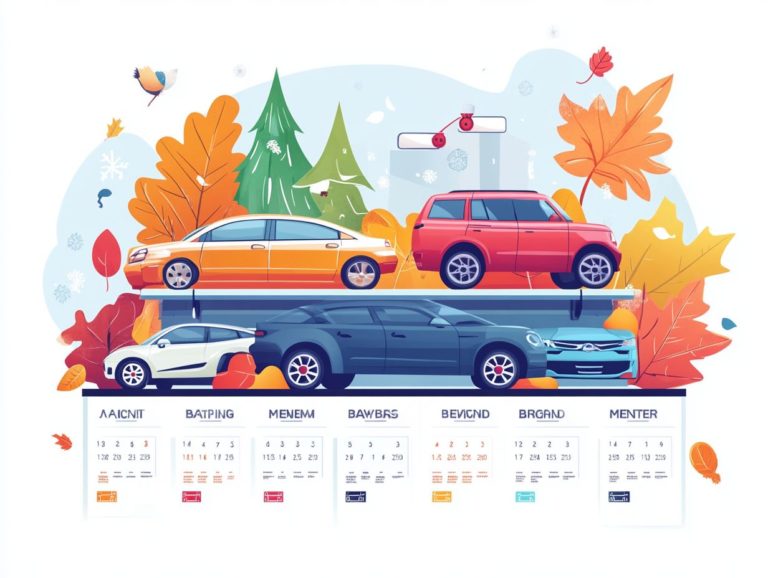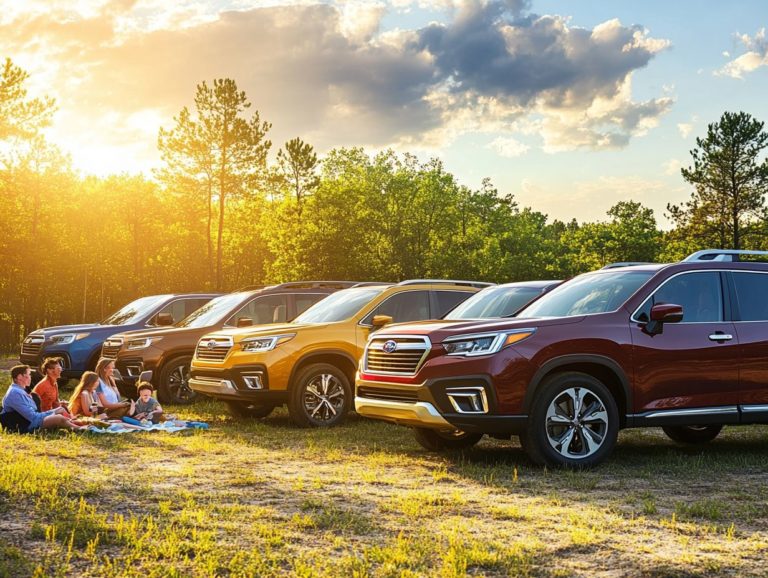How to Spot a Good New Car Deal
Finding the right car deal can indeed feel overwhelming, but it doesn t have to be. Understanding what defines a good deal is your first step toward making a savvy purchase. This article delves into essential strategies for researching and comparing prices, offers effective negotiation tips, and outlines various financing options that can help you save money. It also covers important extras like warranties and trade-in considerations. With the right knowledge at your fingertips, you can drive off the lot thrilled and proud of your smart choice.
Contents
- Key Takeaways:
- Understanding Car Deals
- Researching and Comparing Prices
- Negotiating for a Better Deal
- Financing Options
- Additional Considerations
- Frequently Asked Questions
- What is considered a good new car deal?
- How can I research the market to find the best new car deals?
- What should I look for when comparing new car deals?
- Is it better to buy or lease a new car for a good deal?
- How can I negotiate for a good new car deal?
- Are there any red flags to watch out for when looking for a good new car deal?
Key Takeaways:

- Do your research and compare prices online and at dealerships to spot a good new car deal.
- Negotiate for a better deal by being prepared, staying firm, and exploring financing options.
- Don’t forget to consider warranties, maintenance plans, and trade-in options when evaluating a new car deal.
Understanding Car Deals
Understanding car deals is essential for any discerning buyer. This involves grasping key components such as the MSRP, dealer discounts, and the significance of additional products like GAP insurance and maintenance plans.
It s not just about honing your negotiation skills; you also need to be well-versed in factors like the vehicle’s equity and financing options. By conducting thorough research prior to your purchase and comparing an itemized quote with the market price report, you can easily navigate the complex world of car dealerships. This preparation ensures that you secure the best overall price.
What Makes a Good Car Deal?
A good car deal is all about a perfect blend of factors that leave you feeling satisfied with your purchase. This includes a favorable selling price, enticing dealer discounts, and tips for first-time new car buyers that ensure a competitive out-the-door price truly reflects the vehicle’s value.
Essentially, you should evaluate the total cost of the vehicle, taking into account any additional fees that could impact your overall expenditure. When hunting for that ideal deal, it’s crucial to grasp how various price adjustments and limited-time discounts can enhance your value compared to traditional offers.
Add-on products like extended warranties or maintenance plans can greatly affect how valuable the deal feels. Weigh these elements carefully, as they can either elevate or diminish the appeal of the car deal you’re being presented with.
Researching and Comparing Prices
Researching and comparing prices is a crucial step for you as a car buyer. This process involves gathering data from various resources, such as market price reports and detailed quotes from different dealerships. By doing so, you enable yourself to make informed decisions regarding financing options and the overall costs involved.
Using Online Resources
Utilizing online resources is essential for today s car buyers. It allows you to access market price reports, compare vehicle prices across different dealerships, and explore various financing options all without the pressure of immediate sales tactics. This digital landscape enables you to conduct thorough research from the comfort of your home, transforming the car buying experience from daunting to manageable.
Among the wealth of tools at your disposal, comprehensive market price reports offer invaluable insights into fair pricing, while dealer comparison sites enable you to assess offers side by side. These resources often come equipped with handy financing calculators, helping you gain a clearer understanding of your budget and payment options.
By leveraging these advantages, you can make informed decisions and negotiate with confidence, ensuring you secure the best deal possible.
Visiting Dealerships

Visiting car dealerships is a crucial step in your car-buying journey. It s your opportunity to receive detailed quotes, directly inquire about dealer discounts, and explore financing options that best suit your desired vehicle.
When you step onto the dealership lot, be prepared to gather as much information as possible. Visiting multiple dealerships can really pay off! This helps you compare offerings and ensure you re getting the best deal available.
As you navigate through the models and features, pay close attention to the details in the detailed quotes to avoid any hidden fees or unexpected costs. Don’t hesitate to actively ask about current dealer discounts; these can significantly reduce the overall price.
Ask about different financing options like loans or leasing agreements. Understanding interest rates and terms will enable you to make informed financial decisions that serve you well in the long run.
Negotiating for a Better Deal
Negotiating for a better deal is an essential part of the car-buying process. It requires employing effective negotiation tactics to lower the out-the-door price, secure dealer discounts, and improve financing options.
By mastering these strategies, you can ensure that you receive an exceptional deal on your new vehicle, ultimately making the experience both rewarding and financially savvy.
Tips for Negotiating
To secure a good deal, understanding dealership retention strategies, leveraging financing options, and being cautious of add-on offers that can inflate the final price is essential.
Timing your visit could save you big bucks, so don t wait! Consider going at the end of the month or year when dealerships are eager to meet their sales goals, making them more open to negotiation.
Conduct thorough research beforehand regarding the market value of your desired vehicle. This knowledge equips you with the data needed to counter inflated asking prices effectively.
Recognizing the dealer’s psychology is also crucial; they want to maintain their profit margins. The art of negotiation lies in crafting a win-win scenario for both parties.
By deploying these strategies, you can navigate the complex landscape of car purchases with confidence and finesse.
Financing Options
Grasping your financing options is essential when you’re in the market for a car. It requires careful evaluation of interest rates, associated costs, and supplementary products such as GAP insurance insurance that covers the gap between what you owe on your car and its actual cash value and Vehicle Service Contracts. All these elements can significantly shape your overall car-buying experience.
Understanding Interest Rates and Terms
Understanding the intricacies of interest rates and financing terms is crucial for you as a car buyer. These factors can significantly influence the overall costs associated with purchasing a vehicle from dealerships.
Consider this: a lower interest rate can lead to reduced monthly payments, allowing you to manage your budget more effectively while also decreasing the total amount paid over the life of the loan. On the flip side, opting for longer loan terms may result in smaller monthly payments, but they often come with the downside of accruing more interest, ultimately driving up the total cost.
Car dealerships often showcase a variety of financing packages, making it essential for you to evaluate these options meticulously. By analyzing the interplay between interest rates, loan terms, and the dealership s offers, you can navigate your options more effectively and secure a deal that aligns seamlessly with your financial goals.
Additional Considerations

When you’re navigating the car buying process, it s essential to consider additional factors that can significantly enhance both the value and satisfaction of your purchase.
Selecting a maintenance plan tailored to your needs, evaluating a Vehicle Service Contract, and grasping the advantages of GAP insurance can make a world of difference.
Plus, don t forget to weigh your trade-in options for existing vehicles they can add even more value to your new acquisition.
Warranties and Maintenance Plans
Choosing the right warranties and maintenance plans is vital for you as a car buyer! These options offer peace of mind against unexpected repair costs and ensure your vehicle’s long-term reliability through Vehicle Service Contracts.
These protective options not only safeguard your investment but also cultivate a reassuring sense of security throughout your ownership experience. With various warranty types available like bumper-to-bumper, powertrain, or extended warranties it s essential to assess your driving habits and the expected longevity of your vehicle.
Maintenance plans streamline your regular servicing while potentially reducing out-of-pocket expenses! As you consider these options, weigh the costs against potential savings on repairs. Understanding the value added through comprehensive insurance coverage is crucial for making an informed decision.
Trade-in Options
Evaluating trade-in options can significantly impact your car-buying journey</b! By understanding your vehicle’s value, you can negotiate the selling price at dealerships effectively. This knowledge unlocks substantial savings and secures a more favorable deal.
Knowing the worth of your current vehicle allows you to leverage that equity! This reduces the out-of-pocket costs of your new purchase. Gather market estimates for your vehicle’s value to set realistic expectations. Being ready to discuss your trade-in’s condition, mileage, and unique features can significantly enhance your negotiating power.
Explore the trade-in policies of different dealerships, as some may offer better values than others. This can ultimately influence the total purchase price of your new car in a meaningful way.
Frequently Asked Questions
What is considered a good new car deal?
A good new car deal is one where you get the car you want at a price that fits your budget! This could mean negotiating a lower price, getting a good trade-in value for your old car, or receiving understanding the fine print of new car deals from the dealership.
How can I research the market to find the best new car deals?
Many resources are available online to help you research the market and find the best new car deals! Compare prices and features on different car manufacturer websites, read reviews from other buyers, and check for any current promotions or discounts. Additionally, consider looking into negotiating tips for buying a new car to ensure you get the best possible deal.

What should I look for when comparing new car deals?
When comparing new car deals, consider not just the initial price of the car but also the long-term costs, such as maintenance, insurance, and fuel efficiency. To ensure you get the best deal, check out these negotiation tips for buying a new car and look at the warranty and any additional features or bonuses included in the deal!
Is it better to buy or lease a new car for a good deal?
This depends on your personal preferences and financial situation! Leasing a car may result in lower monthly payments, but you won t own the car at the end of the lease. Buying a car may have higher upfront costs, but you will have full ownership and the ability to sell the car in the future.
How can I negotiate for a good new car deal?
Do your research and come prepared with knowledge about the market and the specific car you want! Be confident and willing to walk away if the deal is not satisfactory. Negotiate not just on the car price but also on financing options and any additional incentives.
Are there any red flags to watch out for when looking for a good new car deal?
Yes, be wary of deals that seem too good to be true or dealerships that pressure you into making a quick decision! Watch out for hidden fees and ensure you carefully read and understand all paperwork before signing any contracts.






